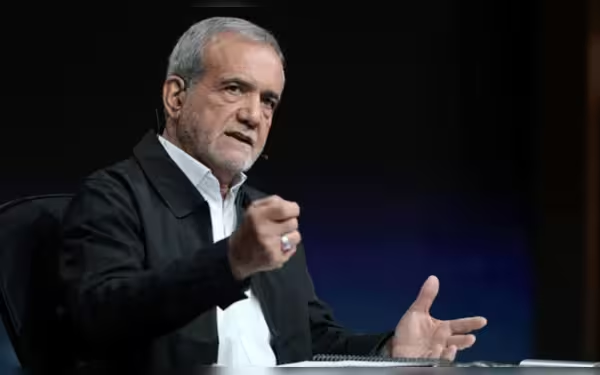Thursday, November 7, 2024 08:33 AM
Iran President Warns of Response to Israeli Strikes Amid Ceasefire Talks
- Iran's President discusses potential ceasefire impact.
- Israel's strikes targeted Iranian military sites.
- Iran vows to respond to any aggression.
 Image Credits: brecorder
Image Credits: brecorderIran's President warns that a ceasefire could influence responses to Israeli strikes amid escalating tensions.
In recent developments, tensions between Iran and Israel have escalated significantly, particularly following a series of military strikes. On October 26, Israeli warplanes targeted Iranian military sites, claiming it was a response to a missile barrage launched by Tehran on October 1. This ongoing conflict has raised concerns about the potential for a broader confrontation in the region.
Iran's President, Masoud Pezeshkian, addressed the situation on Sunday, stating that a potential ceasefire between Iran's allies and Israel “could affect the intensity” of Iran's response to the recent Israeli strikes. He emphasized that if Israel were to reconsider its actions, accept a ceasefire, and cease its attacks on innocent people, it might influence how Iran reacts. However, he firmly stated that Iran “will not leave unanswered any aggression against its sovereignty and security.”
The backdrop of this conflict is complex, involving various regional players. Iran has been vocal about its commitment to retaliate against any aggression, with Supreme Leader Ayatollah Ali Khamenei asserting that both the United States and Israel should expect a “tooth-breaking response” for their actions against Iran and its allies. This rhetoric highlights the seriousness with which Iran views its national security and the defense of its interests.
In the wake of the strikes, Israeli Prime Minister Benjamin Netanyahu claimed that the attacks were aimed at crippling Iran’s defense capabilities and missile production. Reports from Iranian armed forces indicated that the strikes resulted in the deaths of four military personnel and caused limited damage to radar systems, while Iranian media also reported the death of a civilian.
The situation remains precarious, with both sides on high alert. The potential for a ceasefire could provide a glimmer of hope for de-escalation, but the path to peace is fraught with challenges. As the international community watches closely, the actions taken by both Iran and Israel in the coming days will be crucial in determining the future of stability in the region.
The ongoing conflict between Iran and Israel serves as a stark reminder of the fragile nature of peace in the Middle East. While the prospect of a ceasefire offers a chance for dialogue, the entrenched positions of both sides make it clear that achieving lasting peace will require significant effort and compromise. As events unfold, it is essential for all parties involved to prioritize diplomacy over military action to prevent further loss of life and promote stability in the region.













